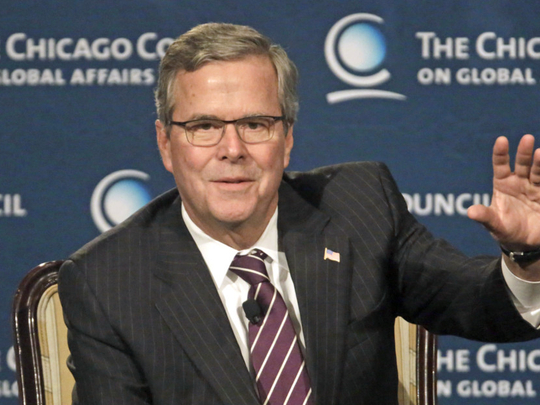
Jeb Bush delivered a foreign-policy address on Wednesday in which he stated: “I am my own man.” He also rolled out a list of foreign-policy advisers, who turn out to be mostly from the two Bush administrations.
So which is it?
As Jamelle Bouie of Slate says: “By definition, a presidential nominee is not their ‘own’ person.”
This is not specifically about Jeb though, as Bouie notes. It may be worse for him. It is a problem for anyone who may be the first to follow a president from his party who was widely perceived as having failed in one area (or more). It was a problem for Jimmy Carter in foreign policy eight years after Lyndon Johnson and Vietnam; and a problem for Bill Clinton 12 years after Carter’s record on just about everything.
Clinton’s solution was to use as few Carter people as possible. The result was a disaster: The original Clinton White House staff was notably lacking in White House experience and the consequence was perhaps the worst transition in the modern presidency. Had Clinton been willing to find a few of the best people from the Carter years to mix in with the newcomers, it is possible that his first year could have been far more productive and the mid-term losses in 1994 less severe.
So Douthat is correct: Any new Republican president is going to draw from recent Republican presidents, and rightly so, despite the disasters of the George W. Bush administration. That is because, as Bouie suggests, presidential nominations are not about individual candidates as much as they are about party decisions, with the winner adopting party positions and the party’s governing professionals. Do not forget, too, that Bush is competing hard for the nomination now and wants to show various party factions that they can be comfortable with him. A broad-based advisory team is part of that whether he intends to listen to all of them or not.
All that said: Presidential judgement matters, too. Any Republican president in 2002 was going to be surrounded by hawks eager to invade Iraq; George W. Bush was unusually easy to roll and lax in pushing his national-security team about the holes in their plans.
So one thing to look for in a nominee is evidence that he will be good at challenging his team when they come to him with foolish ideas. A way to begin to get a sense of that is by determining who may be in the smaller group he or she is listening to.
Mostly, however, Jeb’s decision to include people who were calamitously wrong on Iraq as part of his foreign-policy team is not about him, or about the Bush family. It is about a Republican party that still stubbornly refuses to accept that Iraq was a disaster. If I am correct that Rand Paul does not have any real chance of being nominated, then that is going to be a problem for any of the viable Republican candidates.
— Washington Post
Jonathan Bernstein is a Bloomberg View columnist covering US politics.











